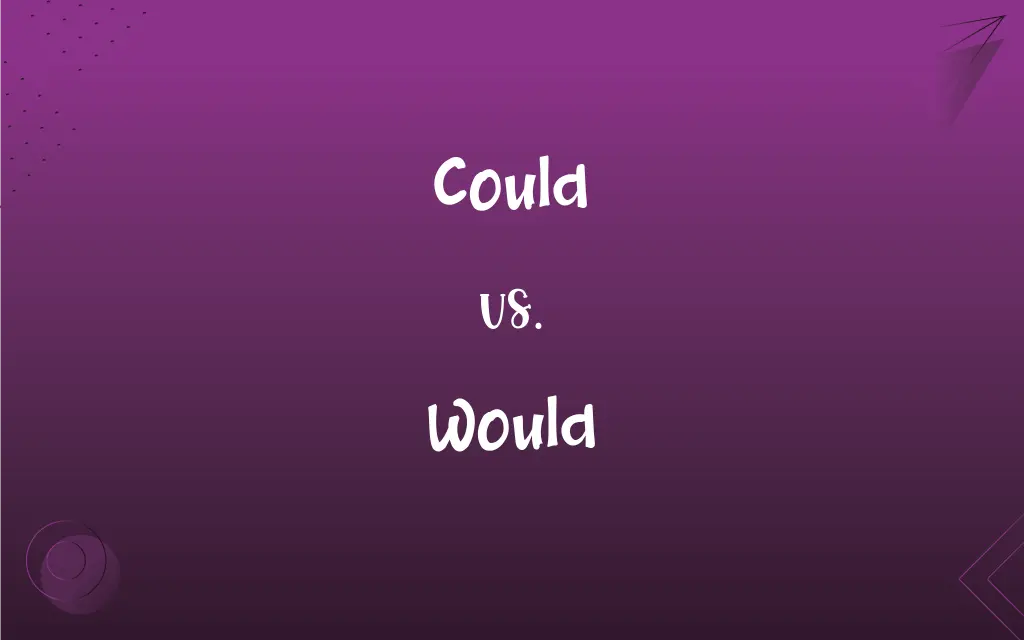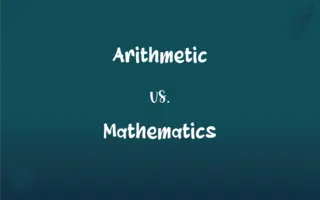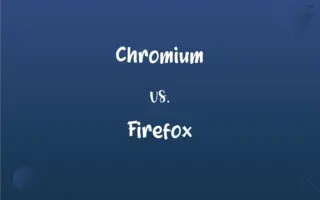Could vs. Would: What's the Difference?
Edited by Janet White || By Harlon Moss || Updated on October 25, 2023
"Could" indicates past ability or possibility, while "would" refers to a future intention or hypothetical situation.

Key Differences
"Could" and "would" are both modal verbs in the English language, each with distinct usages. "Could" often implies a capability or possibility, while "would" typically suggests a future intention or a hypothetical condition.
When referring to past abilities, "could" is the preferred modal verb. For instance, saying "I could swim when I was five" indicates a past ability. In contrast, "would" is not generally used to express past abilities but rather to express repeated actions in the past, as in "Every summer, we would go to the beach."
"Could" can also be used to indicate a polite request or suggestion. For example, "Could you pass the salt?" Meanwhile, "would" is frequently used for polite offers or invitations, as in "Would you like some coffee?"
In terms of expressing hypothetical situations, both "could" and "would" are employed. "Could" presents a possible scenario (e.g., "It could rain tomorrow"), while "would" delves into the consequences of a hypothetical condition (e.g., "If I had a million dollars, I would travel the world").
"Could" can sometimes signify a conditional form of "can," indicating what someone is able to do under certain conditions. For example, "I could help if I had more time." "Would," conversely, often pairs with "if" to describe conditions and results, as in "If she studied harder, she would pass."
ADVERTISEMENT
Comparison Chart
Basic Meaning
Indicates past ability or possibility.
Refers to future intention or hypotheticals.
Past Abilities
Yes (e.g., "I could swim.")
No, but indicates repeated actions in the past.
Polite Requests
Yes (e.g., "Could you help?")
Often used for offers (e.g., "Would you like?")
Hypotheticals
Possible scenarios (e.g., "It could rain.")
Consequences (e.g., "I would travel.")
Conditionality
Conditional ability (e.g., "I could if I had...")
Often pairs with "if" for results.
ADVERTISEMENT
Could and Would Definitions
Could
Expressing a conditional capability.
I could finish it if I had more resources.
Would
Polite offer or invitation.
Would you like some tea?
Could
Past tense form of "can."
I could run five miles daily last year.
Would
Expressing a future intention in the past.
He said he would come.
Could
A polite request.
Could you please open the window?
Would
Showing preference or desire.
I would rather read than watch TV.
Could
Expressing possibility.
It could rain tomorrow.
Would
Indicating repeated actions in the past.
Every weekend, we would visit our grandparents.
Could
Suggesting potential actions.
We could go to the movies tonight.
Would
Expressing hypothetical results.
If I knew the answer, I would tell you.
Could
Inflection of can
Would
Past tense of will; usually followed by a bare infinitive.
FAQs
How is "would" typically used?
"Would" usually refers to future intentions or hypotheticals.
Can both "could" and "would" express hypotheticals?
Yes, but "could" suggests possibility, while "would" suggests hypothetical consequences.
Is "would" ever used for past actions?
Yes, for repeated actions in the past, like "We would visit every year."
What's the primary use of "could"?
"Could" often indicates past ability or possibility.
Can "could" indicate a past possibility that didn't happen?
Yes, as in "I could have won if I tried harder."
Can "would" indicate a preference?
Yes, e.g., "I would prefer coffee."
How does "could" relate to conditions?
"Could" can indicate what's possible under certain conditions.
Is "would" used with "if" clauses?
Yes, to describe hypothetical conditions and results.
Can "could" express doubt?
Yes, as in "That could be the right answer."
Is "could" ever used for future possibilities?
Yes, but it's often less certain than "will."
Is "could" the past tense of "can"?
Yes, it often functions as the past tense of "can."
Can "could" indicate a future possibility?
Yes, as in "It could snow tomorrow."
Can "could" suggest a suggestion?
Yes, e.g., "We could try this new restaurant."
How do "should" and "would" compare?
"Should" offers advice or obligation, while "would" discusses hypotheticals or intentions.
How is "would" used in reported speech?
It can express a future intention in the past, e.g., "She said she would come."
Can "could" be used for polite requests?
Yes, e.g., "Could you pass the bread?"
How do "will" and "would" differ?
"Will" is more definitive about future actions, while "would" often implies conditions or hypotheticals.
How is "would" used with "rather"?
To express preference, e.g., "I would rather not go."
Can "would" express routine in the past?
Yes, like in "When I was young, I would fish every summer."
How do "can" and "could" differ in requests?
"Could" is often more polite than "can" in requests.
About Author
Written by
Harlon MossHarlon is a seasoned quality moderator and accomplished content writer for Difference Wiki. An alumnus of the prestigious University of California, he earned his degree in Computer Science. Leveraging his academic background, Harlon brings a meticulous and informed perspective to his work, ensuring content accuracy and excellence.
Edited by
Janet WhiteJanet White has been an esteemed writer and blogger for Difference Wiki. Holding a Master's degree in Science and Medical Journalism from the prestigious Boston University, she has consistently demonstrated her expertise and passion for her field. When she's not immersed in her work, Janet relishes her time exercising, delving into a good book, and cherishing moments with friends and family.































































